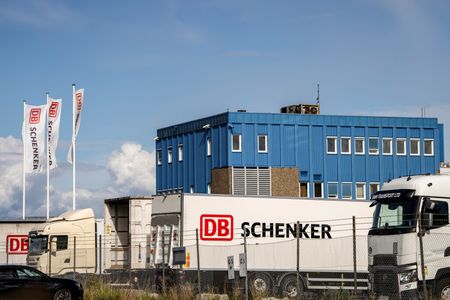By Stine Jacobsen, Jacob Gronholt-Pedersen and Rachel More
COPENHAGEN/BERLIN (Reuters) – Denmark’s DSV has agreed to buy Schenker, the logistics arm of German state rail operator Deutsche Bahn, for 14.3 billion euros ($15.85 billion) in a deal that would make it the world’s biggest logistics company.
The acquisition will be the biggest by a Danish company and, according to DSV, propel it above DHL Logistics and Swiss group Kuehne und Nagel in both volume and revenue, but will still only give the group between 6% and 7% of a highly fragmented global logistics market.
DSV, which started as a small enterprise of 10 truckers in 1976, has grown through a string of acquisitions – sometimes taking over companies larger than itself.
“The size of this one is actually larger than all the transactions we’ve done before,” CEO Jens Lund told journalists.
Deutsche Bahn put Schenker up for sale last year to concentrate on its core railway business in Germany and reduce its debt.
Financial investor CVC was the other bidder remaining in the race to buy Schenker, after Maersk and Bahri withdrew their bids.
Shares in DSV rose as much as 4% at opening and were trading 0.2% lower at 0949, following recent gains triggered by reports that a deal was imminent.
“The shape of the deal is broadly in line with our thinking but at a slightly better price,” Bernstein analysts said in a note.
The all-cash transaction will be financed through a combination of an equity raising of 4-5 billion euros and debt financing, DSV said.
The combined group will have revenue of 293 billion Danish crowns ($43.52 billion) based on 2023 results, with a workforce of about 147,000 across more than 90 countries.
DSV’s Chief Financial Officer Michael Ebbe told Reuters it planned to cut between 1,600 and 1,900 jobs out of Schenker’s German workforce of 15,000, but stressed that with 1 billion euros investments planned in Germany the combined group will have more employees in Germany five years from now than Schenker and DSV have combined today.
German labour unions have warned against selling Schenker to DSV, fearing potential job losses. As part of the deal, DSV will spend 10 million euro in extra compensation to soothe union resistance, Ebbe said.
The deal, subject to regulatory and German ministerial approval as well as by Deutsche Bahn’s supervisory board, is expected to close in the second quarter of next year.
($1 = 0.9022 euros)
($1 = 6.7329 Danish crowns)
(This story has been corrected to say that the combined group will be bigger than both DHL and Kuehne und Nagel, not just Kuehne und Nagel, in paragraph 2)
(Reporting by Louise Rasmussen, Stine Jacobsen and Jacob Gronholt-Pedersen in Copenhagen, Rachel More and Markus Wacket in Berlin; Editing by Terje Solsvik, David Goodman and Tomasz Janowski)





